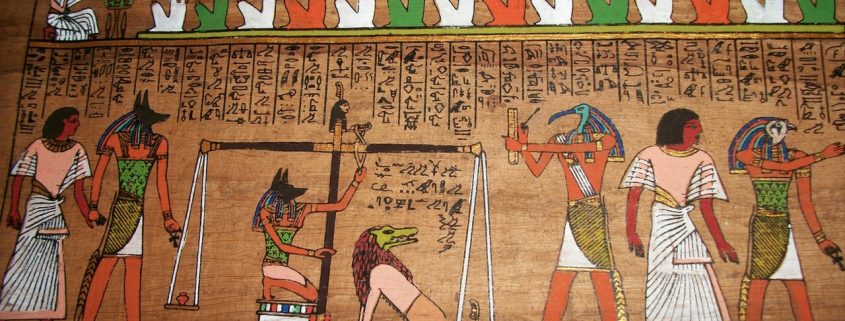The victories over Og of Bashan and his ally, Sihon of Heshbon, were the last two battles fought by the Israelites under Moses. Since you’ve read your Old Testament, you know that Moses didn’t live much longer after the clash at Og’s royal city, Edrei. The Israelites retraced their steps along the King’s Highway, and then turned west at Heshbon to camp in the Plains of Moab, across the Jordan River from Jericho. That takes place toward the end of the Book of Numbers, just before the fascinating encounter with the prophet-for-profit Balaam.
An inscription discovered in 1967 at Deir Alla, a town about twenty-five miles north of the Plains of Moab, three miles east of the Jordan River in modern-day Jordan, mentions Balaam, son of Beor by name. While the text is probably from the eighth century B.C., about 650 years after the incident with Balaam (around 1406 B.C.), it confirms that there were people who believed a prophet named Balaam son of Beor, a “divine seer,” was a historical character. And this evidence was found about a two-day journey from where the king of Moab, Balak, offered Balaam the going rate for a high-quality curse. Instead, Balaam delivered several blessings on Israel. To his credit, at least the prophet refused to say anything Yahweh didn’t put in his mouth.
Before parting ways with the furious king of Moab, Balaam offered one of the best-known prophecies in the Old Testament, one that is clearly messianic:
I see him, but not now;
I behold him, but not near:
a star shall come out of Jacob,
and a scepter shall rise out of Israel;
it shall crush the forehead of Moab
and break down all the sons of Sheth. (Numbers 24:17, ESV)
Scholars have argued for literally thousands of years about the exact meaning of this passage. Some have believed there is no messianic application to Balaam’s prophecy. For example, Martin Luther just couldn’t accept that God would use a devious pagan like Balaam that way. Of course, that ignores Numbers 24:2, which tells us that “the Spirit of God came upon him.” Others believe the passage was fulfilled by David; still others think the process began with David but won’t be completed until the Messiah returns. I’m setting aside all of that to focus on the very last line of Balaam’s oracle.
Have you ever read this verse and wondered who, exactly, are the sons of Sheth? Some translations render the name “Seth,” and a few read “sons of tumult” instead of Seth or Sheth. Here is the key question: Which Seth are we talking about here? The most prominent Seth in the Bible Allow me to put forward two possibilities I doubt you’ve heard before.
First, consider the possibility that the sons of Sheth are followers of a pagan god. Seth and Sheth are alternate transliterations of the name of Egyptian chaos-god, Set (also spelled Sutekh, Setekh, and Setesh). During Egypt’s Second Intermediate Period, Lower Egypt (that is, northern Egypt) was ruled by a Semitic-speaking people called the Hyksos, who were almost certainly Amorites. The most important god in their pantheon was Baal, who was merged by the Hyksos with Set.
The timing of the end of the Hyksos era in Egypt is fuzzy, but most scholars place it about a hundred years or so before the Exodus. They were driven out after a series of wars led by native Egyptian rulers based at Thebes. While it would be convenient to think that the Hyksos were utterly destroyed by the Egyptians or simply disappeared from history, that’s unlikely. It’s more probable that they were driven out of Egypt into Arabia or the Transjordan, absorbed into the native Egyptian population, or a bit of both. Since the worship of Baal-Set continued in Egypt for at least two hundred years after the Exodus, long after the fall of the Hyksos kingdom, that may be closest to what happened.
Is it possible that the prophecy refers to David’s defeat of Set-worshiping desert nomads southeast of the Dead Sea? Maybe. To be honest, I was more excited about that idea a year and a half ago when I wrote The Great Inception. Now, not so much.
In our next installment, we’ll try another interpretation of that prophecy on for size.

Derek Gilbert Bio
Derek P. Gilbert hosts SkyWatchTV, a Christian television program that airs on several national networks, the long-running interview podcast A View from the Bunker, and co-hosts SciFriday, a weekly television program that analyzes science news with his wife, author Sharon K. Gilbert.
Before joining SkyWatchTV in 2015, his secular broadcasting career spanned more than 25 years with stops at radio stations in Philadelphia, Saint Louis, Little Rock, and suburban Chicago.
Derek is a Christian, a husband and a father. He’s been a regular speaker at Bible prophecy conferences in recent years. Derek’s most recent book is The Great Inception: Satan’s PSYOPs from Eden to Armageddon. He has also published the novels The God Conspiracy and Iron Dragons, and he’s a contributing author to the nonfiction anthologies God’s Ghostbusters, Blood on the Altar, I Predict: What 12 Global Experts Believe You Will See by 2025, and When Once We Were a Nation.





Leave a Reply
Want to join the discussion?Feel free to contribute!